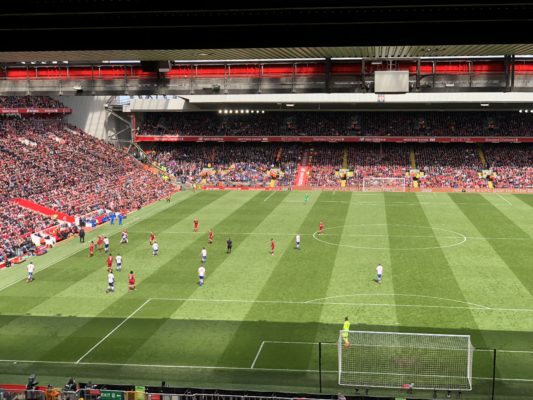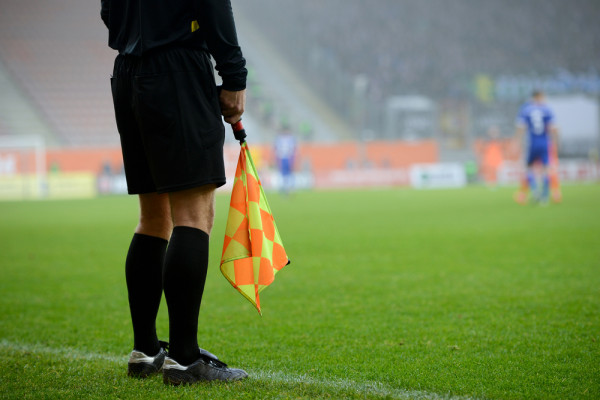Anyone who has read my columns on a regular basis will know that I’m a massive critic of Premier League referees and a fierce advocate of the introduction of VAR. It’s not that I think referees in the top-fight are all incompetent, although I do think that there are a fair few who tick that particular box. It’s more that I think officials generally fall into one of two boxes: those that can’t keep up with the play and those that stick to a narrative they’ve decided upon before a ball is kicked. When it comes to the former, John Moss is the prime example. I’ve lost count of the number of times a major incident has occurred during a football match and Mr. Moss is nowhere near what’s happening. We can debate until the cows come home about whether or not he should be a referee at all when he lacks the basic fitness to keep up with modern footballers, but the same is true for more than just him and even if we agree he shouldn’t be that won’t change the fact that he is.
OFFICIAL: VAR will be used in the Premier League next season.… ” pic.twitter.com/6n9pgdUzhT
— Soccer PM (@Soccer_PM_) November 18, 2018
The reality of modern day football is that the players are faster than ever before. Even the most unfit centre-back is almost certainly fitter and more capable of running up and down the pitch all day than most of the middle-aged-men who make up the referee’s roster. Then there are those that arrive at a ground determined to follow a pre-set narrative, even if only subconsciously. Let’s be honest, we’ve experienced that more than most football clubs over the past couple of seasons with officials who have refused to give us stonewall penalties. I’ll explore that topic a little more thoroughly during the piece, so don’t want to say too much here. The point is, though, that referees genuinely aren’t all as useless as we say they are. Yet even with that being the case, there almost isn’t a match that goes by in which a big decision is called incorrectly by the men in the middle. I for one, then, am a huge fan of the Premier League’s decision in principle to introduce the Video Assistant Referee system from next season and here I’ll look at why I think it will be good for Liverpool.
Why Some People Are Against It
Rather than start by jumping straight in and explaining why I think it will be so good for the sport, I first wanted to take a moment to acknowledge VAR’s critics. If you’re one of them then I can’t promise I’ll give your side of the argument a fair hearing, if for no other reason than I completely disagree with you. I do have to admit that you exist, however, and that not all of your opinions are utter tosh (just most of them). Those that are against the introduction of the Video Assistant Referee into the game seem to dislike it for a few reasons, starting with the fact that decisions are confusing for those inside the ground and take too long to be made. I do think that this criticism has some substance and I’m hopeful that those in charge of the Premier League will work hard to mitigate them.
Am I the only one who doesn’t want the Premier League to use VAR? like it’s gonna slow down the game so much 🤨😤
— thank u, next (@mermzy99) November 18, 2018
It’s also worth noting that the current system isn’t always flawless. Last season when Tottenham Hotspur came to Anfield a ball was played through to a Spurs payer who was in an offside position. The referee wasn’t sure whether or not Dejan Lovren had intentionally touched the ball so he went over to consult with his assistant. There was then a long and involved conversation between the two of them discussing whether or not it was legal, eventually deciding to rule in favour of the away team. They got the decision wrong. Had they had the use of VAR then they’d have almost certainly come to the correct decision much quicker than it took them to come to the wrong one. VAR isn’t perfect, but it will allow referee to get more decisions right in the same amount of time that they currently do the opposite.

From The Kop
I’m also confused by the argument that it’s better, as a match going fan, for referees to get decisions incorrect than correct if it means the atmosphere remains unspoilt. Is football a sport or an entertainment? Does it exist to please the fans in the ground or as a competitive event that is designed to see the teams that are actually the best, as opposed to the luckiest, succeed? If it’s the former then ok, but I do think that that removes your ability to complain about being treated as ‘customers’; if it’s title more than entertainment for the match going supporter then they are no different to people who go to the cinema or theatre and those that supply the ‘entertainment’ are surely within their rights to find more ways of making money from it in a capitalist society?
The premier league have got a lot to learn with VAR.
They should start to work with the RFU now as their TMO is spot on.
Clear instruction from the ref and clear comms. Instant decisions— Andrew Mc (@maca1380) November 17, 2018
If, on the other hand, it’s a competitive sport then surely those responsible for the upkeep of the rules should do everything that they can to ensure that those rules are enacted correctly as often as possible? That being said, I do think that football can learn a lot from other sports in terms of how to use the video system. There is more than enough money in the Premier League for it to become a requirement of clubs to install big screens on all four sides of their ground so that supporters can know what’s going on. I also think that playing the discussion between the referee and the assistant over the tannoy in the stadium will stop fans from feeling in the dark and allow them to feel as though they’re part of the experience instead. Regardless, getting decisions right is more important than the feelings of supporters.
The System’s Not Perfect But It’s Better Than What We Have
It remains a genuinely stunning statistic that Liverpool have received fewer penalties at Anfield in the Premier League than Tottenham Hotspur since the start of last season. Think about how long we tend to spend with possession of the football, how often we’re in the oppositions’ area with it and how tricky most of our attacking players are and then think about how statistically improbable it is a team from North London has been more deserving of spot-kicks in the league than we have. That comes down to that idea of pre-conceived narratives that I mentioned earlier. Referees know that there are two grounds in the country where they can ‘prove’ that they won’t be influenced by the crowd: Old Trafford and Anfield. Since the days of Alex Ferguson referees have been terrified of giving penalties against Manchester United or refusing to give the Scot’s team one, so they prove themselves at out place instead.
VAR will be good for football providing it involves the fans; let’s have the big screen replays like every other sport, maybe the use of SMART Vote somehow… Football needs to stop lacking behind other sports in fan engagement. #VAR #PremierLeague
— Shan Gambling (@shangambling) November 18, 2018
The introduction of the Video Assistant Referee removes the ability for referees to perform to their own beat. Instead, they’ll be pulled up on any dreadful decisions by the men in the booth. That’s not to say that the system’s flawless, of course. I think one of the problems that VAR’s critics have is that they genuinely don’t seem to understand what it is; that is almost certainly because of the constant use of the acronym rather than the full title. Some people seem to think that it is some sort of automated, computerised system that can’t make mistakes. Instead it is an assistant just like the ones on the line but with the ability to watch things back on a monitor. As a result, the person in control is liable to make exactly the same sort of mistakes that they would make if they were officiating the match in person, only that will almost certainly happen less often.

As things currently stand, officials are having to simply guess at what’s taken place more often than not. For example, in a penalty incident they’ve either seen a player go down and thought that they exaggerated contact or invented the movement of a defender’s leg when it hasn’t actually happened and therefore ignored or given a penalty incorrectly. With the ability to consult with a referee that can watch things back on video, however, such occasions will become far less frequent. That doesn’t mean that they won’t happen, though. So much of football is subjective that there will still be decisions made that you disagree with. I think some people seem to assume that VAR means you’ll never again watch a referee match a decision that you don’t agree with, but that’s obviously not true.
#VAR is brilliant news for the @premierleague BUT dont confuse inviting the challenge, to force an error, to find contact…with a dive, 2 completely different things #PremierLeague
— Paul Breen-Turner (@paulbreenturner) November 18, 2018
I’m also not trying to suggest that Liverpool will suddenly win the league and never lose a match again because of the use of the Video Assistant Referee. Opposition supporters would be quick to point out that we’ve benefitted from as many dodgy decisions as we’ve suffered at the hands of. Yet wouldn’t it be better if there was no question about the validity of the Premier League winner’s performances? Whilst there’ll still be some incorrect decisions moving forward, I would hazard a guess that 95% of them will be right. At the very least we can know that the subjective decision has been reached after viewing all available material and not just guessed at by a referee too unfit to be in the right part of the pitch when it happens. The technology exists to help referees out, so why on earth would football supporters not want to do that for the sake of a minute or two inside the ground? It’s time we catch up with pretty much every other sport and allow referees to stop guessing; perhaps they’ll even give us a penalty every now and then.




Reallly good piece. I’m always baffled at the fact that most critics of VAR don’t acknowledge that almost all of their issues come down to poor quality of refereeing and not Video Assisted Refereeing; as if VAR is some sentient being sent down by footballing governing bodies with the sole purpose of destroying the game. VAR is simply a tool. A tool that is almost flawless. The implementation of that tool has been terrible so far, but it can be better. Football has been stuck in the technological dark ages for years, clinging to some bizarre notion of the unspoilt ‘beautiful game’. The sooner that the sport acknowledges that it isn’t so beautiful and looks to the examples of other sports to implement the tech correctly, the better.
Thanks, Jake. I think you’ve summed it up excellently there. As you say, the system is as close to flawless as we can get right now, but that doesn’t mean that its implementation is.